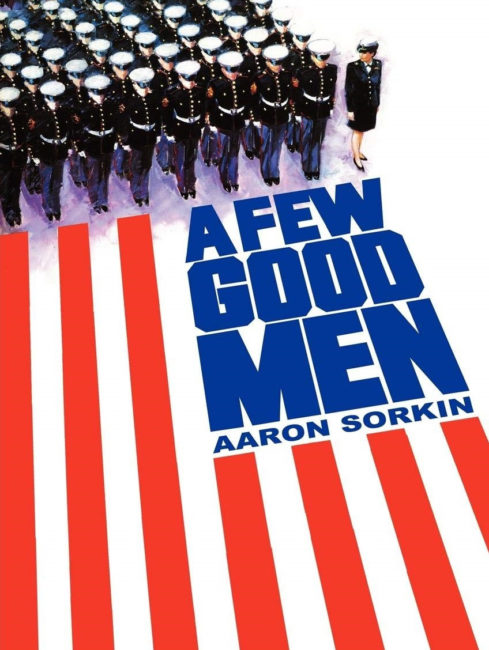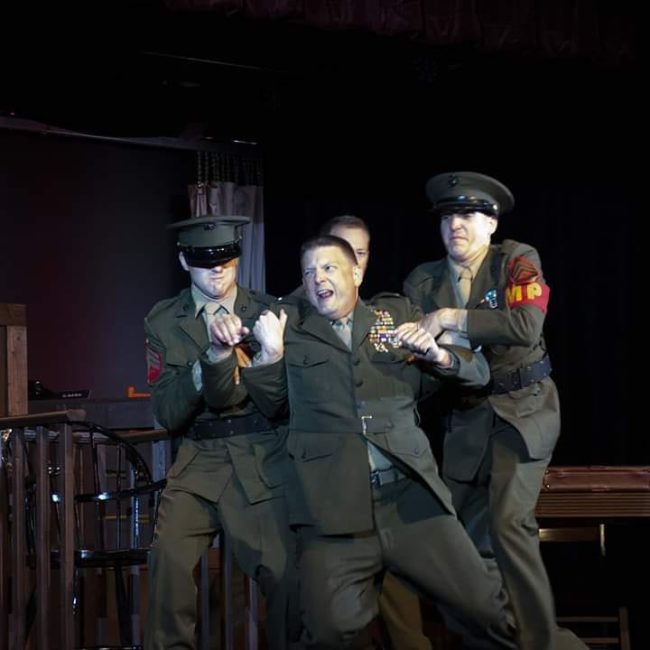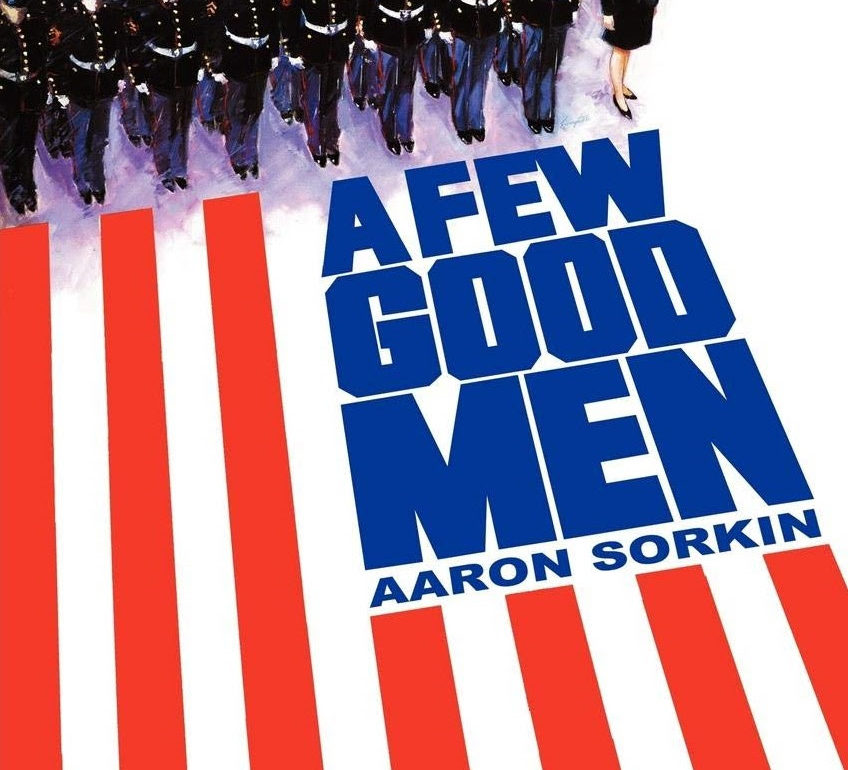Aaron Sorkin’s A Few Good Men, directed by Todd Starkey, opens up to one of our only moments watching Greg Stiffler give us a reason to care about the tragedy the play is built around, by making him a vulnerable guy. A man is dead and Lance Cpl. Harold W. Dawson (played by Lamar Leonard) and Pfc. Louden Downey (played by Jordan Baumiller) stand accused of murder. Moises Estrada’s lighting and sound design built atmosphere as Eva Grove’s costume coordination lent an air of authenticity to these characters, opening the door for their respective actors to make them real. The play really came together with the details of set, lighting, and actor placement emphasizing the natural atmosphere the acting took place in, as Mr. Starkey has done a wonderful job.

Lt Cmdr. Joanne Galloway, played by Samantha Murray, and Lt. J.g. Daniel A. Kaffee, played by Joe Weinhoffer, have a rocky start as “Jo” demonstrates a resolve and dedication to following her hunch that these boys are innocent, even so far as contacting their family members to legitimize her ability to butt into Kaffee’s case. Watching her lure Kaffee into a position where he starts caring about doing what’s right for what might be the first time in his career only works because she sells the audience on the intelligence and wit of her character, but leaves enough of a flaw, in her lack of ability to argue a case, that Kaffee is still relevant, even if we might wonder why we have to put up with him, as she is doing. Kaffee is pompously confident because he knows who he is and what he wants, and would be happy to have it without the complication of Galloway being in his path, and both Murray and Weinhoffer deserve credit for keeping the right amount of tension between their characters to keep their scenes interesting, as we get to know them.
I initially didn’t see Lt. J.g. Sam Weinberg as much more than a way to provide a little comic relief and a foil to provide perspective on Kaffee, but the honesty of his expression as he related his reason for hoping these defendants lose their case gave the audience a reason and a moment to reflect on defendants, which we might not have otherwise had. My whole perspective on if our two scapegoat murderers are truly innocent was rocked, although not entirely changed, and Jake Stuart’s convincing condescension brought that home. Even if this character can feel like it’s a manufactured Devil’s advocate, useful to keep the story from being too one-sided, Stuart plays it for all it’s worth, so Weinberg’s alternate point of view carries some weight.
As our protagonists slowly figure out what really went on, the audience is also piecing together details that point in the right direction, guiding them along. Lt. Jonathan James Kendrick, played by Leif McCurry, offers the biggest clue, as the unwritten Marine Code smacks of his brand of religious zeal, leaving us to wonder how deep he is involved in what happened to poor Santiago. Our defendants are protecting someone, or something, and we do not know its nature, or why they would be willing to take the fall for it, but indoctrination into the blind worship of Marine honor and integrity only works as well as it does to explain their actions because McCurry is believable in his portrayal a man that uses faith in that way – perhaps even on himself. It’s the characters that inch this play along and keep it exciting, so it’s critical that McCurry seems both aware that something has gone terribly wrong, but also seems willing to use every religious comment he can make to keep his secret under wraps.
The do-or-die moment of the play, where innocence or guilt is presumed to be decided, may be what inspired much of the courtroom dramatics we see in television shows like Law and Order and videogames like Ace Attorney, and Judge Julius Alexander Randolph, played by Phil Hansel, is center stage of it. One aspect of this role that is common to nearly all representations is that the judge is a sampling of how we expect the jury is feeling, so we usually see their opinion and emotions swayed by the defense and prosecution, to keep things exciting, and in the this case we have no jury, so things are more direct. Hansel’s interactions with Brian Ruff being back memories of the last time I fought a traffic citation, as he wasn’t overacting the part, but was in control, which I don’t see very much of in the simulated courtroom. I would like to also mention that after taking his bow, he made it to the front of the opera house and was holding the door for folks that might struggle to get out of the building, still in his full costume, bedecked in medals, so while that wasn’t part of the play, it was totally possible that he carried some of his character with him, though it may be more likely that he carries compassion everywhere he goes.

There is a scene in this play that is so famous for its intensity that I’ve known it nearly all my life, without ever seeing the play or the film adaptation. Much has been written about how that scene could have been more exciting if the defense hadn’t already explained its strategy, earlier in the play. I see this predictability not as a weakness but as an intentional way to make sure the audience is ready and waiting for the emotional explosion Col. Nathan R. Jessep delivers, as he is baited into a meltdown. If you’re going to have fireworks, perhaps making sure the town is watching the right part of the sky is a good idea, but the drawback is you have to deliver something that exceeds expectations, and that’s exactly what Brian Ruff did in this role. The confusion on his face and belligerence of his outrage were authentic. As I walked out of the theater, I turned past other audience members who were remarking on how they knew a given actor and were surprised by how little the character’s behavior resembled the thespian portraying it, because their personality was transformed, in character; if this is a play that relies heavily on acting talent, this production of it is the one you want to see.
Running Time: Approximately 2 hours and 20 minutes with one intermission
A Few Good Men plays through September 29, 2019 with Tidewater Players at The Historic Havre de Grace Opera House— 121 N. Union Street in historic downtown Havre de Grace, MD. For tickets call the box office at 667-225-8433 or purchase them online.

